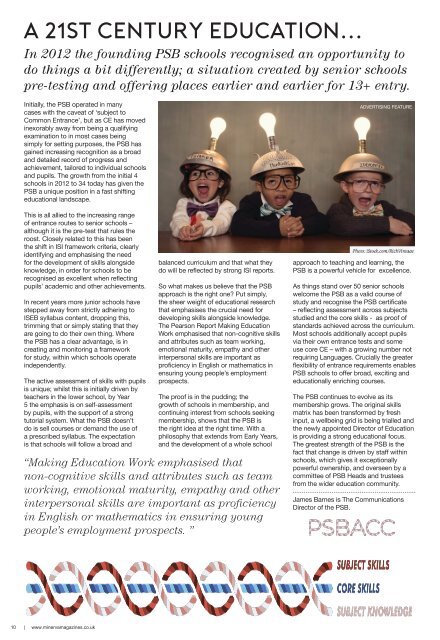Horsham Living Dec 2021 - Jan 2022
At last the Christmas editions are here! With festive fun, gifts and interiors, plus kitchen design advice from Interior Design expert Julia Kendell and an interview with the Yorkshire Shepherdess Amanda Owen. Plus, our competition pages return, with staycations, laundry upgrades, festive hampers and a chance to win tickets to see Paloma Faith in concert!
At last the Christmas editions are here! With festive fun, gifts and interiors, plus kitchen design advice from Interior Design expert Julia Kendell and an interview with the Yorkshire Shepherdess Amanda Owen. Plus, our competition pages return, with staycations, laundry upgrades, festive hampers and a chance to win tickets to see Paloma Faith in concert!
You also want an ePaper? Increase the reach of your titles
YUMPU automatically turns print PDFs into web optimized ePapers that Google loves.
A 21st century education...<br />
In 2012 the founding PSB schools recognised an opportunity to<br />
do things a bit differently; a situation created by senior schools<br />
pre-testing and offering places earlier and earlier for 13+ entry.<br />
ADVERTISING FEATURE<br />
Initially, the PSB operated in many<br />
cases with the caveat of ‘subject to<br />
Common Entrance’, but as CE has moved<br />
inexorably away from being a qualifying<br />
examination to in most cases being<br />
simply for setting purposes, the PSB has<br />
gained increasing recognition as a broad<br />
and detailed record of progress and<br />
achievement, tailored to individual schools<br />
and pupils. The growth from the initial 4<br />
schools in 2012 to 34 today has given the<br />
PSB a unique position in a fast shifting<br />
educational landscape.<br />
This is all allied to the increasing range<br />
of entrance routes to senior schools –<br />
although it is the pre-test that rules the<br />
roost. Closely related to this has been<br />
the shift in ISI framework criteria, clearly<br />
identifying and emphasising the need<br />
for the development of skills alongside<br />
knowledge, in order for schools to be<br />
recognised as excellent when reflecting<br />
pupils’ academic and other achievements.<br />
In recent years more junior schools have<br />
stepped away from strictly adhering to<br />
ISEB syllabus content, dropping this,<br />
trimming that or simply stating that they<br />
are going to do their own thing. Where<br />
the PSB has a clear advantage, is in<br />
creating and monitoring a framework<br />
for study, within which schools operate<br />
independently.<br />
The active assessment of skills with pupils<br />
is unique; whilst this is initially driven by<br />
teachers in the lower school, by Year<br />
5 the emphasis is on self-assessment<br />
by pupils, with the support of a strong<br />
tutorial system. What the PSB doesn’t<br />
do is sell courses or demand the use of<br />
a prescribed syllabus. The expectation<br />
is that schools will follow a broad and<br />
balanced curriculum and that what they<br />
do will be reflected by strong ISI reports.<br />
So what makes us believe that the PSB<br />
approach is the right one? Put simply,<br />
the sheer weight of educational research<br />
that emphasises the crucial need for<br />
developing skills alongside knowledge.<br />
The Pearson Report Making Education<br />
Work emphasised that non-cognitive skills<br />
and attributes such as team working,<br />
emotional maturity, empathy and other<br />
interpersonal skills are important as<br />
proficiency in English or mathematics in<br />
ensuring young people’s employment<br />
prospects.<br />
The proof is in the pudding; the<br />
growth of schools in membership, and<br />
continuing interest from schools seeking<br />
membership, shows that the PSB is<br />
the right idea at the right time. With a<br />
philosophy that extends from Early Years,<br />
and the development of a whole school<br />
“Making Education Work emphasised that<br />
non-cognitive skills and attributes such as team<br />
working, emotional maturity, empathy and other<br />
interpersonal skills are important as proficiency<br />
in English or mathematics in ensuring young<br />
people’s employment prospects. ”<br />
ADVERTISING FEATURE<br />
approach to teaching and learning, the<br />
PSB is a powerful vehicle for excellence.<br />
As things stand over 50 senior schools<br />
welcome the PSB as a valid course of<br />
study and recognise the PSB certificate<br />
– reflecting assessment across subjects<br />
studied and the core skills - as proof of<br />
standards achieved across the curriculum.<br />
Most schools additionally accept pupils<br />
via their own entrance tests and some<br />
use core CE – with a growing number not<br />
requiring Languages. Crucially the greater<br />
flexibility of entrance requirements enables<br />
PSB schools to offer broad, exciting and<br />
educationally enriching courses.<br />
The PSB continues to evolve as its<br />
membership grows. The original skills<br />
matrix has been transformed by fresh<br />
input, a wellbeing grid is being trialled and<br />
the newly appointed Director of Education<br />
is providing a strong educational focus.<br />
The greatest strength of the PSB is the<br />
fact that change is driven by staff within<br />
schools, which gives it exceptionally<br />
powerful ownership, and overseen by a<br />
committee of PSB Heads and trustees<br />
from the wider education community.<br />
James Barnes is The Communications<br />
Director of the PSB.<br />
10 | www.minervamagazines.co.uk


















